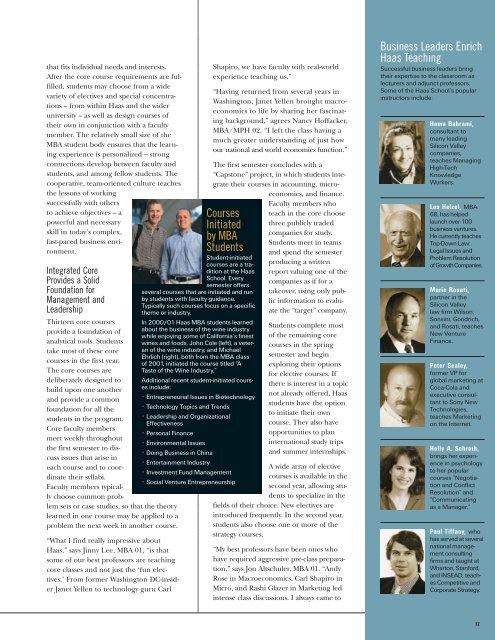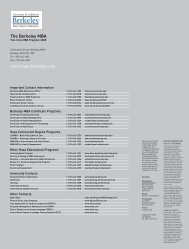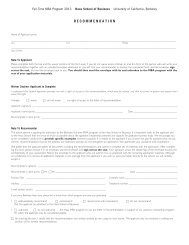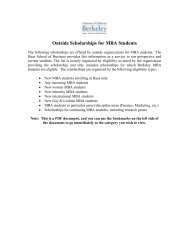TheBerkeleyMBA - Full-time MBA Program, Haas School of ...
TheBerkeleyMBA - Full-time MBA Program, Haas School of ...
TheBerkeleyMBA - Full-time MBA Program, Haas School of ...
You also want an ePaper? Increase the reach of your titles
YUMPU automatically turns print PDFs into web optimized ePapers that Google loves.
that fits individual needs and interests.<br />
After the core course requirements are fulfilled,<br />
students may choose from a wide<br />
variety <strong>of</strong> electives and special concentrations<br />
– from within <strong>Haas</strong> and the wider<br />
university – as well as design courses <strong>of</strong><br />
their own in conjunction with a faculty<br />
member. The relatively small size <strong>of</strong> the<br />
<strong>MBA</strong> student body ensures that the learning<br />
experience is personalized – strong<br />
connections develop between faculty and<br />
students, and among fellow students. The<br />
cooperative, team-oriented culture teaches<br />
the lessons <strong>of</strong> working<br />
successfully with others<br />
to achieve objectives – a<br />
powerful and necessary<br />
skill in today’s complex,<br />
fast-paced business environment.<br />
Integrated Core<br />
Provides a Solid<br />
Foundation for<br />
Management and<br />
Leadership<br />
Thirteen core courses<br />
provide a foundation <strong>of</strong><br />
analytical tools. Students<br />
take most <strong>of</strong> these core<br />
courses in the first year.<br />
The core courses are<br />
deliberately designed to<br />
build upon one another<br />
and provide a common<br />
foundation for all the<br />
students in the program.<br />
Core faculty members<br />
meet weekly throughout<br />
the first semester to discuss<br />
issues that arise in<br />
each course and to coordinate<br />
their syllabi.<br />
Faculty members typically<br />
choose common problem<br />
sets or case studies, so that the theory<br />
learned in one course may be applied to a<br />
problem the next week in another course.<br />
“What I find really impressive about<br />
<strong>Haas</strong>,” says Jinny Lee, <strong>MBA</strong> 01, “is that<br />
some <strong>of</strong> our best pr<strong>of</strong>essors are teaching<br />
core classes and not just the ‘fun electives.’<br />
From former Washington DC-insider<br />
Janet Yellen to technology guru Carl<br />
Courses<br />
Initiated<br />
by <strong>MBA</strong><br />
Students<br />
Student-initiated<br />
courses are a tradition<br />
at the <strong>Haas</strong><br />
<strong>School</strong>. Every<br />
semester <strong>of</strong>fers<br />
several courses that are initiated and run<br />
by students with faculty guidance.<br />
Typically such courses focus on a specific<br />
theme or industry.<br />
In 2000/01 <strong>Haas</strong> <strong>MBA</strong> students learned<br />
about the business <strong>of</strong> the wine industry<br />
while enjoying some <strong>of</strong> California’s finest<br />
wines and foods. John Cole (left), a veteran<br />
<strong>of</strong> the wine industry, and Michael<br />
Ehrlich (right), both from the <strong>MBA</strong> class<br />
<strong>of</strong> 2001, initiated the course titled “A<br />
Taste <strong>of</strong> the Wine Industry.”<br />
Additional recent student-initiated courses<br />
include:<br />
• Entrepreneurial Issues in Biotechnology<br />
• Technology Topics and Trends<br />
• Leadership and Organizational<br />
Effectiveness<br />
• Personal Finance<br />
• Environmental Issues<br />
• Doing Business in China<br />
• Entertainment Industry<br />
• Investment Fund Management<br />
• Social Venture Entrepreneurship<br />
Shapiro, we have faculty with real-world<br />
experience teaching us.”<br />
“Having returned from several years in<br />
Washington, Janet Yellen brought macroeconomics<br />
to life by sharing her fascinating<br />
background,” agrees Nancy H<strong>of</strong>facker,<br />
<strong>MBA</strong>/MPH 02. “I left the class having a<br />
much greater understanding <strong>of</strong> just how<br />
our national and world economies function.”<br />
The first semester concludes with a<br />
“Capstone” project, in which students integrate<br />
their courses in accounting, microeconomics,<br />
and finance.<br />
Faculty members who<br />
teach in the core choose<br />
three publicly traded<br />
companies for study.<br />
Students meet in teams<br />
and spend the semester<br />
producing a written<br />
report valuing one <strong>of</strong> the<br />
companies as if for a<br />
takeover, using only public<br />
information to evaluate<br />
the “target” company.<br />
Students complete most<br />
<strong>of</strong> the remaining core<br />
courses in the spring<br />
semester and begin<br />
exploring their options<br />
for elective courses. If<br />
there is interest in a topic<br />
not already <strong>of</strong>fered, <strong>Haas</strong><br />
students have the option<br />
to initiate their own<br />
course. They also have<br />
opportunities to plan<br />
international study trips<br />
and summer internships.<br />
A wide array <strong>of</strong> elective<br />
courses is available in the<br />
second year, allowing students<br />
to specialize in the<br />
fields <strong>of</strong> their choice. New electives are<br />
introduced frequently. In the second year,<br />
students also choose one or more <strong>of</strong> the<br />
strategy courses.<br />
“My best pr<strong>of</strong>essors have been ones who<br />
have required aggressive pre-class preparation,”<br />
says Jon Altschuler, <strong>MBA</strong> 01. “Andy<br />
Rose in Macroeconomics, Carl Shapiro in<br />
Micro, and Rashi Glazer in Marketing led<br />
intense class discussions. I always came to<br />
Business Leaders Enrich<br />
<strong>Haas</strong> Teaching<br />
Successful business leaders bring<br />
their expertise to the classroom as<br />
lecturers and adjunct pr<strong>of</strong>essors.<br />
Some <strong>of</strong> the <strong>Haas</strong> <strong>School</strong>’s popular<br />
instructors include:<br />
Homa Bahrami,<br />
consultant to<br />
many leading<br />
Silicon Valley<br />
companies,<br />
teaches Managing<br />
High-Tech<br />
Knowledge<br />
Workers.<br />
Leo Helzel, <strong>MBA</strong><br />
68, has helped<br />
launch over 100<br />
business ventures.<br />
He currently teaches<br />
Top-Down Law:<br />
Legal Issues and<br />
Problem Resolution<br />
<strong>of</strong> Growth Companies.<br />
Mario Rosati,<br />
partner in the<br />
Silicon Valley<br />
law firm Wilson,<br />
Sonsini, Goodrich,<br />
and Rosati, teaches<br />
New Venture<br />
Finance.<br />
Peter Sealey,<br />
former VP for<br />
global marketing at<br />
Coca-Cola and<br />
executive consultant<br />
to Sony New<br />
Technologies,<br />
teaches Marketing<br />
on the Internet.<br />
Holly A. Schroth,<br />
brings her experience<br />
in psychology<br />
to her popular<br />
courses “Negotiation<br />
and Conflict<br />
Resolution” and<br />
“Communicating<br />
as a Manager.”<br />
Paul Tiffany, who<br />
has served at several<br />
national management<br />
consulting<br />
firms and taught at<br />
Wharton, Stanford,<br />
and INSEAD, teaches<br />
Competitive and<br />
Corporate Strategy.<br />
17










